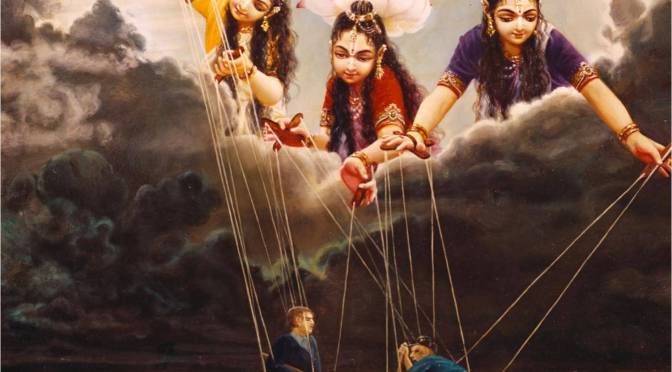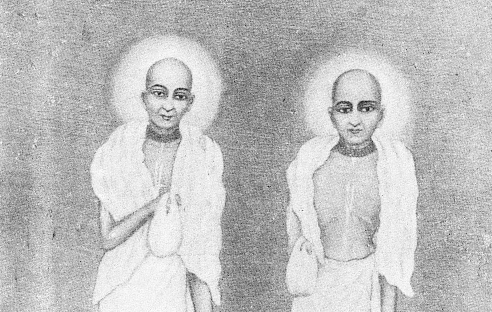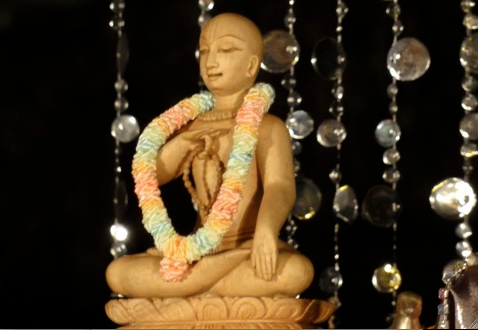Focus your full attention on the first “Hare” , it’s the gateway to the Palace of the holy name , pray for the mercy of Srimati Radharani .If you chant this one hare properly , u can chant the whole mantra properly so keep it simple just first hare with full concentration.
Maskara is made by Grinding Mercury & sulphur together , but initially they are very difficult to grind as they don’t mix with each other but after prolonged grinding it gets mixed and sulphur completely changes its properties , similarly when we make our mind hear the hare krishna mahamantra , it may resist initially , but with prolonged contact with the holy name it will change its nature.
Be proactive and determined not to give into the probings and distractions of nasty mind as we chant.
Chanting should be heart deep not lip deep, Krishna is not pleased by inattentive chanting , it is root cause of all offences
When we touch ice , we feel coldness , why don’t we feel about the holy name same way when we chant ? As we cannot feel the ice if we have thick gloves on , similarly we have gloves of inattention which prevent us from feeling the holy name as krishna
Humility & tolerance protect us from these .
Ajamila just chanted once and he was delivered , why ?
Because he chanted with full attention , in helpless mood ,taking complete shelter as he was dying .
Category Archives: Realisations
Freedom
by Suhotra Swami – A person is an eternal being with limited freedom of choice. His awareness of what choices lie before him is shaped by time-bound material phenomena, which include experiences that are physical, emotional, and mental. The phenomena a person currently experiences are in reaction to his past actions. These reactions are plotted in accordance with three modes of work. Due to his past work within these modes, a person presently has good, mediocre, and bad physical, emotional, and mental experiences. All such experiences are temporary.
In the midst of the matrix of my experience, what do I, a person, ultimately seek? The answer is freedom. “What light is to the eyes,” said a wise man, “what air is to the lungs, what love is to the heart, liberty is to the soul of man.” Everyone wants liberation. Srila Prabhupada, my spiritual teacher, explains that this is the constitutional position of the soul. Constitutionally, we are eternal, complete in knowledge, and full of happiness. But the experience of matter suppresses the experience of our original nature. Now we find ourselves subject to time, ignorance, and misery. Innately, we all yearn for freedom from that suppression.
THREE FALSE CONCEPTIONS OF FREEDOM
A liberated person is free to make real choices. Real choice is possible where there are options of real satisfaction. Unfortunately, the matrix of our experience may not permit us free choice. Why? The answer is quite simple: We are eternal, yet the options available to us in this world are not. We want the experience of unadulterated bliss, yet the options available to us in this world are mixed with distress. Choice as we know it now, within the matrix of our present experience, is insubstantial. We select shadows – of love, social life, recreation and so on – that appear and disappear in time. Yet within the confines of our experience, it seems very difficult for us to understand that we have no real freedom of choice. The matrix even supplies us with three notions of freedom: in goodness, in passion, and in ignorance. Unfortunately, they are not real.
“FREEDOM” IN THE MODE OF GOODNESS
Though it too is ultimately false, the goodness conception of freedom is superior to the others. Here, a person aspires for freedom by knowledge and morality, virtues that greatly boost the power of detachment. However, knowledge and morality do not grant us authority over our senses, namely the eyes, the tongue, the nose, the ear, and the sense of touch. Even in goodness, consciousness remains subjected to physical, emotional, and mental phenomena arising uncontrollably out of good, bad, and mixed fortune. A learned, moral person experiences those phenomena in an analytical, self-composed manner. Being detached from his experience, he may think himself liberated. But he is not really liberated if, in the name of goodness, he remains habituated to a life of imprisonment within mundane sensation. In his book The King of Knowledge, chapter seven, Srila Prabhupada explains:
“Goodness is also a kind of contamination. In goodness one becomes aware of his position and transcendental subjects, etc., but his defect is in thinking, ’Now I have understood everything. Now I am all right.’ He wants to stay here. In other words, the person in the mode of goodness becomes a first class prisoner and, becoming happy in the prison house, wants to stay there.”
OUR TWO NATURES
Our first nature, the substance of our person, is eternal spirit. Our second nature is habit. For example, we have the habit to rejoice or lament our change of fortune. In the language of the Bhagavad-gita, this habit is the duality of bewilderment, which captivates all creatures born in the material world. In a lecture, Srila Prabhupada gave the illustration of a man crying over the death of a son. Who in the world will not cry if his son dies? Even a man of learning and morality will cry at such a loss. “It is habitual,” Srila Prabhupada said. But a person in the mode of goodness tries to be philosophical about it.
In the ancient world, philosophy meant primarily the intellectual method of distinguishing the spirit self from the habits of the body and the mind. Philosophers of the classical Mediterranean culture, which sired European civilization, knew that our first nature can be made well or unwell. The first nature (the spirt self) is made well by the cultivation of virtue. Conversely, as one loses his virtue, his first nature sickens.
In the Latin language, like Sanskrit, the root vir means “strong;” hence, virtue is the quality of a strong, healthy spirit. In European culture there are four classical virtues, foremost of which is sophia, true knowledge of the self beyond time. The others are fortitude, justice, and temperance or self-restraint. In Vedic culture too there are four similar virtues: truthfulness, austerity, mercy, and cleanliness. These are fostered when we refrain from gambling, intoxication, meat-eating (or lack of compassion towards animals and other creatures), and licentiousness.
Attachment to truth is essential to detachment from matter. Above all, truth means the timeless truth beyond my temporal self-image. The image of myself as a father of a son is “true” in a biological, psychological, and social sense, but in fact it is not true in the highest sense because my role as a father is only temporary. It takes real virtue to admit this.
As he laments the death of a son, the grief of a virtuous father is tempered by a sober insight into the deeper meaning of his change of fortune. He knows that what is given and taken away is not his own, for the eternal soul can possess nothing that is temporary. Hence, misfortune for a good person is not really bad. It often serves a lesson healthier than good fortune can, since in so-called good times we tend to forget that nothing in this world can last. As Philosophia, goddess of Greek and Roman thought, declares in The Consolation of Philosophy by Boethius: “But if you could see the plan of providence, you would not think there was evil anywhere.”
The world is so planned that misfortune follows good fortune. The childless King Citraketu felt himself greatly blessed by providence when at last his wife bore him a son. Shortly, in a palace intrigue, the baby was poisoned. The king was emotionally crushed. But the sage Narada showed Citraketu that this loss was the very same gain he had celebrated days before. Thus the son was “good” and “evil,” “friend” and “enemy,” the object of both the king’s happiness and distress. When he understood this, the king really gained something – detachment.
For one detached from material gain and loss, “being” is far more important than “becoming” (becoming a father, for instance). No matter what good or ill fortune comes with time, the virtuous person chooses timeless being – his spiritual substance – over any material situation. On the other hand, a person of weak virtue is attached to the ebb and flow of his destiny. He sees the appearance and disappearance of pleasant and unpleasant experiences within time as good or evil. Because he is blind to his own karma under the wheel of fate, he supposes fate to be blind chance; or he supposes there is no fate at all, that success is tenacity of purpose, and failure the reward for laziness. In any case, his habit is to identify his self with the matrix into which his person is poured, and to identify his self-interest with the experiences he finds in that matrix. Thus, he who is pure spirit, becomes dependent upon the shifting arrangements of matter. Such is his bad habit.
When one becomes increasingly dependent upon and controlled by a bad habit, he is said to be addicted. That addiction is sin. Sin is persistent ignorance of our first nature. Sin develops from meat-eating (or participation in unnecessary animal slaughter), licentiousness, gambling, and intoxication, four kinds of behavior that corrode virtue.
It’s like getting rid of a persistent head ache by chopping off the head.
“FREEDOM” IN THE MODE OF PASSION
In the world of time, the mind hunts for sensual delights that are in turn haunted by old age, disease, death, and rebirth. Yet it is our habit to cherish the restless mind and senses as the agents of our hope. From this habit a passionate philosophy of freedom develops, one that some thinkers call “instrumentalism.”
An instrumentalist is a person for whom the “instrument panel” of the mind and senses is the only valid source of knowledge. He believes the human being can find, with the help of these instruments, the answer to the complex problems of material existence. A human is distinguished from other creatures not by his virtues but by the complexity of his problems. Human questions of right and wrong, true and false, can be solved only on the basis of useful facts, for usefulness is a measure of truth. Theories of the soul and its virtues are useless in practical affairs. Therefore they are untrue. Theories are to be judged not by their “goodness” but by their consequences: what results they give us.
The passionate instrumentalist uses his mind and senses like tools, to locate and dig up treasures buried deep within material nature – riches, rare pleasures, sources of energy, cosmic secrets – that he hopes will serve the needs of the human race. His outlook is prospective, since his faith is invested in the future. Thus “becoming” is far more important than “being.”
But what will he become? He will certainly not become free. His future holds countless births and deaths, for the philosophy of instrumentalism is simply the philosophy of embodied existence. For example, aerospace technology has made it possible for humans to fly high in the sky. If in the human body I convince myself that the most important problems of life are those that flight can solve, I deserve no better than to become a bird in my next life.
“FREEDOM” IN THE MODE OF IGNORANCE
The person in the mode of goodness seeks freedom in being rather than becoming. The person in the mode of passion seeks freedom in becoming rather than being. The person in the mode of ignorance seeks freedom in non-being, or nihilism. He is retrospective in his outlook because in his heart he nurses unending dismay, anger, and frustration about his past experience. Thus he sees hope neither in the present nor future. He chooses to cancel out further involvement in this world by negating his personal self. There are demanding, highly disciplined philosophical systems dedicated to losing one’s self; but, in today’s Western world, many people try it the easy way, through alcohol, drugs, and suicide. Now, there are other angry, frustrated individuals who are not content to passively extinguish themselves. They want to drag the world down with them. Through aggressive, violent behavior and the oppressive domination of others, they seek freedom from the trouble of having to think rationally about the purpose of life. Striking out at the world in blind hatred and trampling it underfoot is just a motif of self-annihilation, as is clear from the examples of history’s famous tyrants like Caligula and Adolf Hitler. Thus, whether he takes the passive or aggressive path, the nihilist’s goal is to eradicate all differences in his life, which means to eradicate life itself.
A creed of voidism is, ex nihilo omne ens qua ens fit – “Every being in so far as it is being is made out of nothing.” If my being is nothing, then neither my self who chooses nor the world of choices has real importance. For a person in goodness, it is important to always choose internal well-being over entanglement in external variety. For a person in passion, it is important to entangle oneself in external variety; yes, more important even than internal well-being. But for a person in ignorance, all this is not worth the trouble.
Good people struggle to be free from the loss of the self to material attraction. Passionate people have no problem with losing themselves in that way. But they struggle to get free from the problems that result from their attraction to matter. The ignorant person claims freedom by disclaiming the importance of the struggles of goodness and passion. He thinks eternal life and worldly happiness are impossible, and the effort to attain them is a waste, an absurdity, nothingness. In Caligula, the French philosopher Albert Camus wrote, “Really this world of ours, this scheme of things as they call it, is quite intolerable. That’s why I want the moon, or happiness, or eternal life – something, in fact, that may sound crazy, but which isn’t this world…This world has no importance; once a man realizes that, he wins his freedom. And yet, I know that all I need is for the impossible to be the impossible!”
On one side, Camus advocated the “ignorant” freedom gained by rejecting life in this world. But that freedom is negative. It is like getting rid of a persistent headache by chopping off the head. On the other side, he admitted this is not what we positively want and need. We want and need positive freedom “to do the impossible.” And what is this impossibility, “Which isn’t this world,” which isn’t the matrix of our present experience? As explained before, it is the freedom to choose among options of real satisfaction, options formed out of the nature of eternal existence, complete knowledge, and pure bliss. But to one in ignorance, because it seems impossible, it is crazy.
REAL FREEDOM
Srimad-Bhagavatam, 3.25.15, explains how a person can be bound by and liberated from the three modes of nature:
“The stage in which the consciousness of the living entity is attracted by the three modes of material nature is called conditional life. But when that same consciousness is attached to the Supreme Personality of Godhead, one is situated in the consciousness of liberation.”
Choice, the essential function of an individual’s consciousness, is defined here. We have two options: to choose to associate with the three modes of nature, or to choose the divine association.
If we choose the modes of nature, we are entrapped by them (the word ‘guna’ means “rope;” each of the modes is a strand of a rope that binds the soul within the matrix of temporal experience). Once so trapped, the soul’s dynamic essence, his power of choice, alternates rapidly back and forth between material dualities: mind and matter, intelligence and foolishness, good and evil, light and darkness, male and female, young and old, sickness and health, heat and cold, pleasure and pain, happiness and distress, wealth and poverty, beauty and ugliness, excitement and boredom, sobriety and whimsy, sanity and insanity, honor and dishonor, fame and infamy, birth and death, up and down.
As long as the soul continues to choose between duality, his field of material activities is perpetuated life after life. Choosing the divine association unties the knot of bondage to material duality. As we shall see, liberation in spiritual association affords the soul unlimited opportunities for substantial choice.
(Excerpt from the book Transcendental Personalism by Suhotra Swami)
Devil or Angel?
by Devamrita Swami
Mirror, mirror on the wall, tell me how I’m special, among them all. Innocent, guilty, or somewhere between? Privately, introspective spiritual persons often interrogate themselves about their honest-to-goodness (or honest-to badness) genuine worth. It’s good to face the truth and swallow hard: harbouring material desire is not innocent, normal,or even acceptable—that is, when considered from the viewpoint of the real world, Krishna’s perspective.
Ouch! Who wants to be known as damaged goods—deformed, misshapen, even perverted.
Gradually, as we spiritually advance in bhakti, we shed the illusory cloak that confers an imagined respectability upon our foolish temporary desires and pursuits for temporary gain. We realize that somehow we have to squeeze into one of two cubby-holes: straightaway embracing the full standard for sane life or determinedly developing toward that normal standard of spiritual sanity.
Though overnight enlightenment hasn’t happened to us, yet we certainly can be progressive and proactive about our spiritual growth. What hurts us most is when we seek to justify or rationalize the material desires that we allow to corrupt us—you know, the maya nonsense that has deviated us from our original constitutional position.
The guiding principle of bhakti in this Age of Quarrel is both magnanimously liberal and therapeutically prescriptive: “The Krishna consciousness movement is meant to attract all types of men, even those who desire things other than the Lord’s devotional service. Through the association of devotees, they gradually begin to render devotional service.” (Cc. Madhya 24:124 purport)
Srila Rupa Goswami – Kesava Krsna das
The opening salvo of the preface for The Nectar of Instruction begins thus: “The Krsna consciousness movement is conducted under the supervision of Srila Rupa Goswami.” What does it mean to have this role? How actively involved is Srila Rupa Goswami in our everyday lives? Is he literally supervising all of us?
Before understanding this supervisory function, we need to know who Srila Rupa Goswami is in relation to ourselves, our spiritual masters, and the previous acaryas going back to the time of Sri Chaitanya Mahaprabhu. Each of the acaryas were unlimitedly powerful, being pure nitya-siddhas, capable of delivering the entire world, but preached in tune with Lord Chaitanya’s wishes to lesser or greater degrees.
The special significance of Srila Rupa Goswami was that not only was he a direct disciple of Lord Chaitanya, and the leader of the six Goswamis of Vrndavana, but the leader of all the acaryas and followers of Srila Prabhupada – present and future. In (Krsna Book ch.86) Srila Prabhupada writes, “The actions of the Krsna consciousness movement are directed by the previous acaryas, headed by Srila Rupa Goswami….”
How Srila Rupa Goswami is spearheading Sri Chaitanya Mahaprabhu’s campaign can be put into perspective with his relationship to Sri Sri Radha- Govinda. Sri Govindadeva is the Lord of – abhidheya. We must bear this in mind when we consider Srila Prabhupada’s contribution and his intimate kinship with Srila Rupa Goswami both in deed and empathy.
Srila Rupa Goswami and Srila Prabhupada mirrored Sri Chaitanya Mahaprabhu’s desire to spread Krsna consciousness everywhere. “The desire of Sri Chaitanya Mahaprabhu is that all over the world everyone, in every village and town, know Him and His sankirtana movement. These are the inner feelings of Sri Chaitanya Mahaprabhu. Srila Rupa Goswami committed to writing all these feelings of the Lord. Now again, by the mercy of Sri Chaitanya Mahaprabhu, the same feelings are being spread all over the world by the servants of the Goswamis, and devotees who are pure and simple will appreciate this attempt.”(CC. Antya 1.118)
Srila Rupa Goswami’s eminent position was summed up by Srila Ramananda Raya the doyen of rasa esotericism. He told Lord Chaitanya, “I see that the truths regarding transcendental mellows that You expounded through my mouth are all explained in the writings of Srila Rupa Goswami.”(CC. Antya 1.204)
After these glowing words of praise spoken by Srila Ramananda Raya, Srila Haridasa Thakura embraced Sri Rupa who humbly said,” I do not know anything. The only transcendental words I can utter are those which Sri Chaitanya Mahaprabhu makes me speak.”(Cc. Antya 1.211) Such good qualities as this endeared him to the Lord who said, “I met Srila Rupa Goswami at Prayaga. He attracted and satisfied Me because of his qualities.”(CC. Antya 1.197)
Srila Narottama dasa Thakura sings: “Sei mor vedera dharana….” That Srila Rupa Goswami’s lotus feet are the law of Vedic scriptures (Sri Rupa Manjari Pada from Prarthana) In fact; his lotus feet are everything for all of us.
Srila Prabhupada equally shares his reverence, he states, “Of all the gopis, Srimate Radharani is topmost. Rupa Goswami and Sanatana Goswami are the most exalted servitors of Srimate Radharani and Lord Sri Chaitanya Mahaprabhu. Those who adhere to their service are known as Rupanuga devotees.”(CC. Madhya 8.246)
In Bhagavad Gita as it is, Srila Prabhupada in his mangalacarana first seeks benediction from his beloved Guru Maharaja Srila Bhaktisiddhanta Sarasvati Thakura with,”Om ajnana timirandhasya….” Who does he go to next? Straight to Srila Rupa Goswami, the supervisor, with the prayer “Sri Chaitanya mano bhistam….”
In what way can we experience such supervision? One example can be found in Krsna Book, in the chapter titled – Songs by the gopis. “For vaisnavas, Your words give transcendental pleasure, and saintly persons who are engaged in distributing Your transcendental message all over the world are first class charitable persons (This was confirmed by Srila Rupa Goswami also, when he addressed Lord Chaitanya as the most munificent incarnation because Lord Chaitanya distributed the words of Krishna and love of Krishna free of charge all over the world)”
This corresponds with the Srimad Bhagavatam verse. 10.31.9; “The nectar of Your words and the descriptions of Your activities are the life and soul of those suffering in this material world. These narrations, transmitted by learned sages, eradicate one’s sinful reactions and bestow good fortune upon whoever hears them. These narrations are broadcast all over the world and are filled with spiritual power. Certainly those who spread the message of Godhead are most munificent.”
If we nurture the – bhuri-da-janah – frame of mind in assisting Srila Prabhupada, and please Srila Rupa Goswami, Sri Chaitanya Mahaprabhu will be thrilled to embrace us. Just as this activity is pleasing to Him, the verse itself is also dear to Him. A nervous King Prataparudra began massaging Lord Chaitanya’s lotus feet and recited this verse, which earned him a merciful and ecstatic embrace from the Lord (CC. Madhya 14.4-18)
Another example of experiencing Srila Rupa Goswami’s supervision is in our eating – our offering of food to the Lord. After Lord Chaitanya placed His lotus feet upon the head of Sri Rupa Goswami, he was moved to offer the – Namo maha vadanyaya…. prayers. It is no accident Srila Prabhupada chose this prayer for us.
What of the next prayer? Out of millions of Vedic verses comprising the scriptures, Srila Prabhupada chose – Namo brahmanya devaya…. Why? Does not – Govindaya namo namah – indicate the same Sri Govindadeva, the Lord of abhidheya? Who is Srila Rupa Goswami’s ishta-deva? This too is no arbitrary arrangement. We can be assured our eating process is guided in the most authorized manner. Such is Srila Prabhupada’s kindness.
Before setting foot on American soil in 1965, Srila Prabhupada noted in his diary, “Today the ship is plying very smoothly; I feel today better. But I am feeling separation from Sri Vrndaban, and my Lords Sri Govinda, Gopinatha, Radha Damodar.” The same consistent or eternal bond to Sri Govinda is expressed.
Onboard Jaladuta, Srila Prabhupada took solace in the Chaitanya Charitamrta, in which the author Srila Krsnadasa Kaviraja prays unto the lotus feet of Sri Rupa and Raghunatha – Sri Rupa and Rati Manjaris, at the end of each chapter. Srila Prabhupada was embarking on a bhuri-da-janah mission in the mood of the gopis.
If we want to understand Sri Chaitanya Mahaprabhu, we have to broaden the scope of our prayers to include Srila Rupa Goswami who has an ever present supervisory role in our spiritual lives. “Those who are fortunate enough to understand Lord Chaitanya as well as the Vrndavana pastimes of Radha and Krishna can be able, by the mercy of Sri Rupa Goswami, know the real identity of Sri Krishna Chaitanya Mahaprabhu.”(TLC ch32)
Your servant Kesava Krsna dasa – GRS.
The Holy Name Chants Us! – Karnamrita das
Monthly Japa Immersion Day
setting six hours aside
for only chanting Hare Krishna
an intensified opportunity for Presence
joined together with others
we gain collective supportive strength
yet each person is alone with the Name
everything else is on hold
our investment only in chanting
revealing our faith and interest.
A pathway from matter to spirit
taste without distraction the entry fee
unlocking our experience of the self
our suitcases of accumulated garbage
like concrete covering our feet
we only have to let go—
yet occasionally the portal opens
then nothing else matters
awakened to see beyond seeing
we are blissfully bathed in divine light.
Realizing we’re moving up the mountain
regardless of external appearances
first and foremost we’re spiritual pilgrims
our task is to remember this frequently
seeing our worldly desires as folly
all material pleasure like a desert
true thirst quenching water, the soul
satisfaction lies in spiritual giving
our eternal engagement in loving service
discovered by the embrace of the holy name.
We sit before Radha Krishna Deities
with only our beads and voice
reducing time to one mantra
learning to be satisfied in a moment
the past and future are illusion
thoughts come, and thoughts go
we have to return to attention
the Divine Couple in Their Names
sitting before a spiritual portal
praying for the grace to enter.





